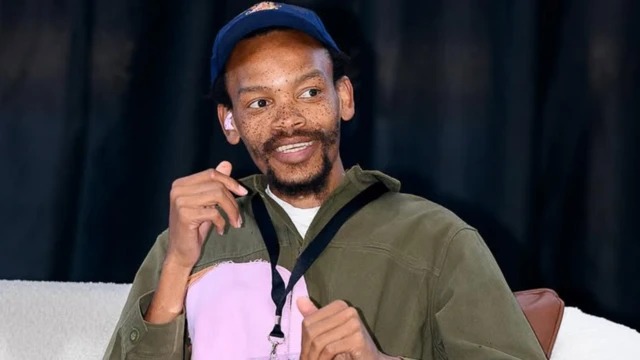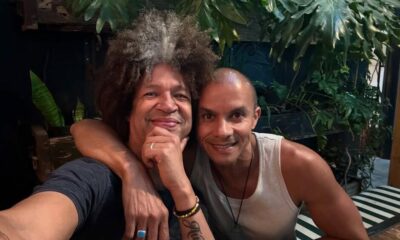Culture Craze
Nota Baloyi’s US Visa Revoked After Charlie Kirk Remarks

A Sudden Blow from Washington
When the United States Department of State announced it had revoked the visas of several foreign nationals accused of making “insensitive or celebratory” comments following the assassination of Charlie Kirk, one South African name rose to the top of that list: Nhlamulo “Nota” Baloyi.
The outspoken music executive, known for his controversial takes and bold social media presence, suddenly found himself at the centre of an international backlash. What began as an offhand online remark quickly escalated into a diplomatic embarrassment.
According to US officials, the decision followed an internal review of online posts deemed to “condone or mock” the death of the conservative American commentator. For Baloyi, the cost was immediate: his US visa was revoked.
The Tweets That Started It All
Shortly after news of Kirk’s assassination broke, Nota posted on X (formerly Twitter) what many perceived as a mocking comment. The now-deleted post read:
“The irony of it all… America preaches peace yet worships war. Maybe it’s time the empire got a taste of its own medicine.”
The post quickly drew outrage from both South African users and international followers. Critics accused him of trivialising a violent death. Within hours, screenshots spread across platforms, and reports reached US authorities.
After his visa was revoked, Nota issued a public apology on X:
“I regret my earlier comment regarding Charlie Kirk. It was insensitive and ill-timed. I did not intend to celebrate anyone’s death. I’ve deleted the post and apologise to those offended.”
In a follow-up tweet, he defended his right to express an opinion but acknowledged that the timing and tone were “wrong.”
“Freedom of speech doesn’t mean freedom from consequence. Lesson learnt.”
An Argentine national said that Kirk “devoted his entire life spreading racist, xenophobic, misogynistic rhetoric” and deserves to burn in hell.
Visa revoked. pic.twitter.com/4bQoXisHsz
Department of State (@StateDept) October 14, 2025
Mzansi Reacts: From Outrage to Mockery
Back home, South Africans wasted no time weighing in. The reactions on social media ranged from criticism to amusement, with many saying this was a predictable outcome for a man known for controversy.
One user wrote,
“The First Amendment doesn’t apply to South Africans, Nota. Are you one?”
Another commented,
“He’s always shouting about accountability. Now look who’s getting schooled.”
And then there was the more sarcastic call from others:
“Come home, buddy. The US clearly isn’t your stage.”
The mixed responses reveal something deeper, a local divide on how far public figures should go when expressing political opinions online.
A South African national mocked Americans grieving the loss of Kirk, saying “they’re hurt that the racist rally ended in attempted martyrdom” and alleging “he was used to astroturf a movement of white nationalist trailer trash.”
Visa revoked. pic.twitter.com/0dgiI31bdk
Department of State (@StateDept) October 14, 2025
The Bigger Picture: When Tweets Cross Borders
While many focused on Baloyi’s personal predicament, the story also highlights a much larger issue. The US State Department confirmed that six other individuals had their visas revoked over similar remarks made after Kirk’s death.
A spokesperson said that foreign nationals who “celebrate or justify acts of violence against Americans” could be barred from entering or remaining in the country.
The incident underscores how quickly a social media post can travel and how global the consequences can become. For celebrities and influencers, the boundaries between expression, accountability, and diplomacy are thinner than ever.
The post has been deleted but the first amendment protects the truth… I will keep exposing the lies. Charlie Kirk was no friend of South Africa but not an enemy either, he was mislead about us like he was when he supported Israel! https://t.co/X7jAfSh1yu https://t.co/bk3noyXpsj
MORAL Authority (@lavidaNOTA) October 15, 2025
Nota’s Next Move
Since issuing his apology, Nota has remained vocal on his platforms, hinting that he feels misunderstood but accepts the penalty. He posted:
“I’ll focus on home for now. Maybe the lesson is that freedom comes with responsibility. South Africa, we still have our own work to do.”
Whether this marks a moment of humility or just another chapter in his long list of public controversies remains to be seen. But for now, his international travel plans are officially on hold.
I would like to make it know that I unconditionally apologise to all those that felt my post was insensitive & ill-timed in any context. I have noted the reactions & response of no more than 10comments to a post which I feel were prompted by the state department’s announcement… pic.twitter.com/3nGqeG6M2i
MORAL Authority (@lavidaNOTA) October 15, 2025
Freedom of Speech or Consequence?
The Nota saga serves as a modern cautionary tale, a reminder that in the age of social media, freedom of speech doesn’t exist in a vacuum. For South Africans observing from afar, it’s another moment of reflection on how local voices can ripple through global currents.
And as many have said on X: “The internet never forgets.”
Follow Joburg ETC on Facebook, Twitter, TikT
For more News in Johannesburg, visit joburgetc.com
Source: Bona Magazine
Featured Image: BBC



























